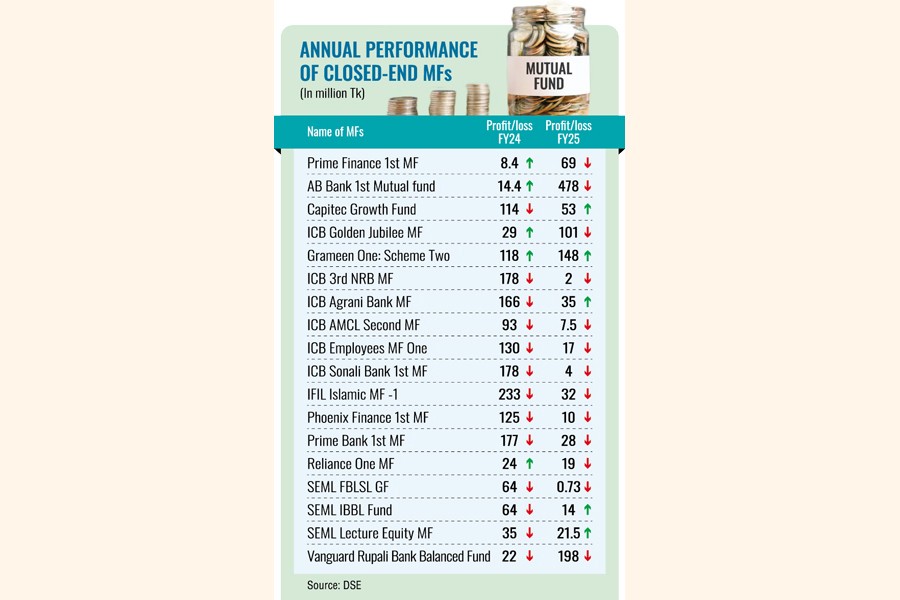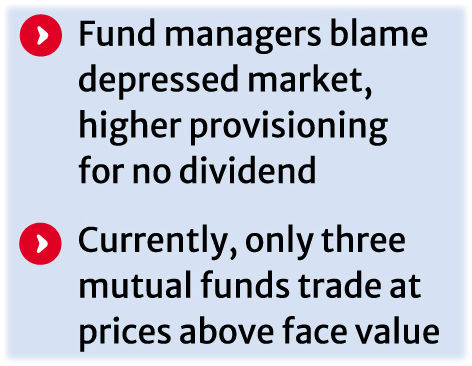
Published :
Updated :

Mutual fund investors are in a tight spot yet again as most closed-end mutual funds failed to declare dividends for the financial year that ended in June 2025 due to depressed market conditions and higher provisioning against unrealised losses.
Fund managers pointed to a number of adverse factors, including price erosion of well-performing stocks and their obligation to keep 100 per cent provision, as as key reasons behind the funds' poor performance
Of the 37 mutual funds listed on the Dhaka Stock Exchange, 18 disclosed their financial statements for FY25. Of them, 16 declared no dividend due to their losses.

Only two mutual funds -- Capitec Grameen Bank Growth Fund and Grameen One: Scheme Two -- declared 3.30 per cent 7.5 per cent cash dividend respectively for FY25.
A mutual fund is a professionally managed collective investment scheme that pools money from many investors and invests it in stocks, bonds and short-term money market instruments.
As per the securities rules, mutual funds are required to invest at least 60 per cent of the equity market such as listed securities and bonds and the remaining 40 per cent in the money market.
But a greater portion of the portfolios of pooled funds managed by different fund managers consists of listed securities. That is why MFs endured substantial erosion in their portfolios in the last few years against the backdrop of unabated fall of the equity market.
Subsequently, the majority of the funds were unable to pay dividends for FY25 as well because of the persistent fall of the equity market in the year to June this year and provisions made for the losses.
The prime index of Dhaka Stock Exchange saw erosion by 9.40 per cent or 502 points to 4,838 points in FY25.
To minimise investment risks, fund managers tend to select blue-chip stocks while making investments. However, most of the stocks had faced price erosion during the financial year ended June this year.
Akramul Aalm, head of research at Royal Capital, said the fund managers had rare opportunities to gain anything from the secondary market as the market went through a bearish trend almost through the financial year.
"Mutual funds' returns highly depend on how the stock market performs in a year as they earn from capital gains in stock trading," he said.
The fund managers also saw significant unrealised losses in their portfolios due to price erosion of some well-performing stocks due to political changeover and economic challenges.
Hence, keeping provision against unrealised losses has become an obligation before considering dividend distribution to unit holders.
Mutual funds also subscribed to initial public offering (IPO) and earn a secured profit from IPO shares. "But there have been no IPOs in the past two years, which also impacted their portfolios," said Mr Alam.
However, he said, mutual funds may turn around from losses as the equity market shows a sign of recovering from prolonged bearish trend, driven by improving macroeconomic indicators.
Earlier, EBL Securities identified 15 companies that were on the priority lists of fund managers, based on an analysis of mutual fund portfolios. The companies include Renata, BAT Bangladesh and Beximco Pharma. However, these stocks endured price erosion between 12.5 per cent and 36 per cent during the financial year, leading to erosion of the portfolios of MFs.
Most of the mutual funds that are yet to declare dividends are expected to pay zero dividends, as their net asset values (NAV) have dropped below the face value, according to another fund manager.
The NAV of a mutual fund shows its ability to give dividends to the unit holders. When the NAV of a fund rises beyond its face value, it is more able to give dividends.
The mutual funds loss was inevitable in FY24 as the broad index of the Dhaka bourse lost 1,015 points during the year.
Portfolio erosion and incurred losses, the eight closed-end funds managed by the ICB Asset Management Company failed to declare any dividends for their unit holders for FY25. The unit holders also did not receive any return in FY24 as well due the staggering losses.
However, losses of ICB Asset Management Company reduced significantly in FY25, compared to FY24.
For example, ICB AMCL 1st Agrani Bank MF reported a profit of Tk 35 million in FY25, recovering from a loss of Tk 166 million in the year before.
Another fund, ICB AMCL Second Mutual Fund incurred a loss of Tk 93 million in FY24. The loss was reduced to Tk 7.5 million in FY25.
Mahmuda Akhter, chief executive officer of ICB Asset Management, told the FE recently that the provisioning they made in FY24 helped reduce losses in FY25.
The zero dividends would have a negative impact on the market, as retail investors have already lost faith in mutual funds.
Currently, out of 37 mutual funds, only three mutual funds -- Prime Finance First Mutual Fund, Grameen One: Scheme Two, and Reliance One the first scheme of Reliance Insurance Mutual Fund -- trade at prices above the face value.
babulfexpress@gmail.com


 For all latest news, follow The Financial Express Google News channel.
For all latest news, follow The Financial Express Google News channel.